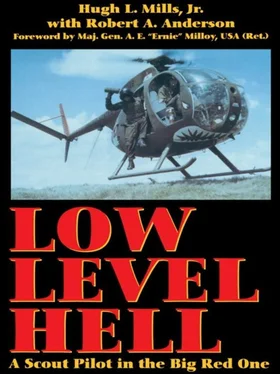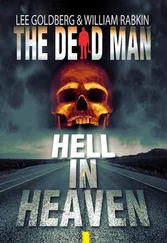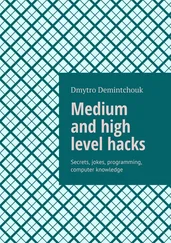At the precise stipulated moment, the Arc Light rained down. The three B-52s, so high that they were invisible from the ground, had been guided into our little grid box by radar. The explosions, even from our distance at Kien, were tremendous, almost as if we were standing right next to a rapid-firing 105. I thought about what it must have been like to be in that box, then put the idea quickly out of my mind.
With word that the last bomb was down, we headed out to take a look. I dropped low and looked down at the smoldering ruins through the gray dust that still hung heavily in the air. I was quickly convinced that absolutely nothing could have lived through that holocaust.
We saw nothing but huge bomb craters, stripped and shredded trees, and the remains of enemy bunkers that had either been blown sky-high or collapsed inward by the blasts. Any form of life surely had been pulverized.
I concluded that an Arc Light strike was the most terrifying sight a man could observe in war. Grimacing from the sight, I was ready to pull the plug and get out of there, leaving that awful grisliness behind. Then, suddenly… almost inconceivably… we began taking AK-47 fire.
I jerked my head left and right, looking for the source. My God, I thought, I don’t believe this. There they were—muzzle flashes coming from a partially caved-in bunker that had incredibly missed being totally destroyed by the bombs. Whoever was on the other end of that assault rifle was mad as hell, and determined to take me down. His fire was sustained and accurate.
As I swung around to meet his challenge, the man broke from the bunker ruins and dove into one of the B-52 bomb craters, with Parker’s rounds hot on his tail. He was bare chested except for his ammo pouch and was carrying his AK-47.
I keyed Foster. “Believe it or not, I’ve got one live enemy soldier down here. He was in one of the blasted-out bunkers and has now ducked into a crater. We’re going to take him out and then I’ll be right back with you.”
Foster rogered, figuring that I couldn’t expect much trouble from one bomb-blasted enemy soldier hiding in an open B-52 crater.
I swung around over the caved-in bunker, which was at the edge of the crater. As I came in over the lip of the crater, the soldier started shooting again. He was putting out more fire on me than I was giving him back. This guy was going to put up a fight.
Every time I hovered over the crater to get him, he’d fire a long, point-blank burst, then disappear back into the crater. I couldn’t tell where he was going.
I backed off again, and decided to make a fast pass over the crater so I could look for his hiding place. He managed to let me have another burst, and some of his rounds hit the aircraft. But I was able to spot a hole in the side of the crater, right underneath the rim. After the soldier ripped off shots at me, he was jumping back into that little hole where I couldn’t see him.
“Damn it, Jimbo,” I said to Parker, “get him. When he sticks his head out, get him, before he gets us with one of those bursts.”
I made three more passes. Again, we exchanged rounds with the little fighter. He hit us with a couple of shots and we missed him completely.
In desperation, I keyed Parker again. “Goddamnit, give me a gas grenade. We’ll gas his ass out of there!”
Parker pulled the pin on a CS grenade and let it fly, right into the center of the crater.
I backed off long enough for the crater to fill with fumes, then eased the Loach in for what I thought would be my last pass. As I gently nosed over the lip, I was once again greeted by a sustained burst of AK fire. The guy now had me frustrated beyond belief.
The next time I came around on the crater, the enemy soldier was out of his hole. He obviously had a snoot full of CS and was having trouble breathing. But that didn’t deter him. As I passed by, he raised his weapon and got off two rounds at me.
Then, nothing. He had either run out of ammo or had a jam. Now I had him. The source of my frustrating little hide-and-seek game… I finally had him cold! He was standing in the base of the crater, and I had no reason in the world not to take him out.
With a little bit of left and aft cyclic, I stopped my right-hand slide and came to a hover. I was fifteen feet over him, and we were looking at each other face-to-face. I dropped my nose a fraction. My finger tightened on the minigun trigger. But I didn’t fire.
In the back of my mind was a clear picture of an enemy soldier in a trench, with his weapon aimed squarely at my head as I hovered over Bob Harris’s ARPs in a similar crater. That guy didn’t shoot… and he had me cold.
I snapped back to reality and looked at the enemy soldier in this crater. Still holding his weapon, he was looking at me with a question in his eyes—why don’t you shoot?
This soldier had endured all that we could throw at him, and he had survived and persevered. His determination and stamina, and that of his countrymen, had sustained him so long, against so many adversaries. To kill this man would have meant nothing, and to kill an unarmed man would have been unforgivable. I said to myself, Let it go, let it go. This bastard deserves to walk out of here.
I hovered in again and looked him in the face. There was no expression. We were eyeball to eyeball for one last moment. Then I nodded my head at him in a salute of respect, dumped the nose, and pulled away.
We would both go home that day. It was my last mission of my first tour in Vietnam.
Vietnam in 1969 was a place where America’s young people went because their country asked them to. While there, they did their jobs the best way they knew how, then looked forward to going home to their friends, families, schools, jobs. Hopefully, also, to the welcome and general approval of the American public.
As a new helicopter pilot, I felt fortunate to be assigned to D Troop (Air), 1st Squadron, 4th Cavalry, and the 1st Division’s crack hunter-killer teams. I was proud to be a member of that unit then, and the years since have only deepened that feeling of regard.
In writing Low Level Hell , I have been fortunate to locate and talk to a number of the other young men who were in the troop with me in 1969. They were most supportive. First, for urging me to accomplish this task. But, more importantly, for their gentle prods to tell it the way it really happened, and to avoid making a “war” story out of it. I have done my best to do that.
It was my intent from the start to use real people, real names. To also—as nearly as I could—recount real situations happening under the circumstances and conditions that existed at the time. To do anything less seemed unfair to those I served with in the troop.
My sincere thanks go to all my comrades for reaching back in their memories, to help sharpen my recalling and recounting the events of 1969. Thanks, especially, to former Four Six, Bob Harris. He took the time, and the special effort, to give me his vivid reflections of that horrendous 28 July day that found him in a bomb crater, and me hovering over it with a box of medical supplies.
My appreciation, also, to Marianne Thornton of Morrison, Colorado. The hours she so willingly spent transcribing many of my audiotapes contributed greatly to keeping the creative process on track. Sandra Irelan and Jan Allgire spent a great deal of their own time typing and retyping drafts of the manuscript. Their gentle prodding kept me on course for nearly five years.
When basing a writing on fact, one obviously tries very hard to be as accurate as possible in all things. If inaccuracies have worked their way into this narrative, be sure that they are not there as the result of any intent on my part to misrepresent the facts. Of course, memory and records do not document the precise words spoken in casual conversations, radio transmissions, and other verbal exchanges. Much of the dialogue that I have written in this story, therefore, has been extrapolated from what the actual words spoken may have been. The reason, while always trying to keep the words in character with the person speaking them, was simply to make the dialogue more understandable and meaningful to the reader.
Читать дальше












